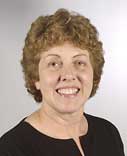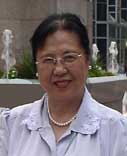Professor of Social Work and Associate Professor of Psychology Carol T. Mowbray died Aug. 23 of cancer. She was co-director of the School of Social Work (SSW) Center for Poverty, Risk, and Mental Health.

From 1996-2001, Mowbray was the SSW associate dean of research. Her nationally and internationally cited research and many publications focused on community integration and recovery for adults with serious mental illnesses, especially homeless people and those with co-occurring substance-use disorders. She also helped develop a special emphasis on women who are mentally ill—especially mothers and their children. Mowbray developed and evaluated the effectiveness of intervention for disadvantaged mentally ill populations, focusing especially on consumer-run and supported education programs in various locations.
“Carol was one of the profession’s intellectual giants,” says Paula Allen-Meares, professor and dean of SSW. “Although I could identify a litany of her intellectual contributions, one that is most notable is that she designed and conducted the only experimental trial of supported education—an intervention designed to assist adults whose postsecondary education was interrupted due to mental illness. This community-based intervention is being replicated throughout the country.”
Mowbray earned her bachelor of science degree in psychology and mathematics and her master of science degree in psychology from Tufts University, and her doctorate in developmental psychology from U-M. Prior to joining SSW in 1994, she was an associate professor and director of the Research Office at the Wayne State University School of Social Work, and was a clinical professor of ecological/community psychology at Michigan State University.
For nearly a decade, Mowbray was the director of research and demonstration projects for the Bureau of Program Development and Quality Assurance at the Michigan Department of Mental Health (MDMH). Prior to that, she held several positions as an evaluator for MDMH.
“I could never possibly express my gratitude for Carol’s influence on me both as a professional and as a person,” says Rich Visengardi, acting director of the Wayne County Mental Health Board. “The experience of working for Carol at MDMH exceeded all my expectations and became much more then simply working for this bright and passionate woman who was clearly ahead of her time. She became both a mentor and a friend. Her legacy is a key motivating factor for all of us to pursue the right things.”
Mowbray was a tireless advocate of psychosocial rehabilitation, especially supported education, and a willing and capable mentor to countless doctoral students, junior faculty members and colleagues during her career.
“Carol’s focus on psychosocial rehabilitation grew from the idea that everyone, regardless of disability, can have a productive role in the life of the community,” says colleague and friend Mark Holter, assistant professor of social work. “This is completely congruent with Carol’s well-deserved reputation for mentoring colleagues and students.
“She enjoyed collaboration and truly valued diverse input. In recognition of her important research contributions and her mentoring, Carol was deeply respected by mental health researchers from around the world.”
Assistant Professor of Social Work at Washington University in St. Louis and U-M alumna Deborah Megivern says, “Dr. Mowbray believed passionately in the potential of research to improve the lives of people with serious mental illness. Over the years, many former clients who have benefited from her interventions approached her to express their gratitude for her stigma-challenging program ideas.
“Dr. Mowbray was also known for her amazing mentoring abilities, in part because of her willingness to mentor professionals who have serious mental illnesses. Just as she worked to cultivate positive change in research populations, she energetically offered her expertise to future generations of mental health researchers,” Megivern says.
Mowbray was a prolific author, contributing more than 130 scientific articles, chapters and books. The recipient of numerous honors and awards during her career, she was honored as the 2005 recipient of the American Psychological Association’s Harold Hildreth Award. The award is given annually to a senior professional whose career and accomplishments embody the highest principles of public service. In addition, the U.S. Psychiatric Rehabilitation Association announced recently that its Early Career Research Award has been renamed the Carol T. Mowbray Award.
Mowbray is survived by two sons, Orion and Nick. She was preceded in death by her husband, Sherman Mowbray. Condolences may be sent to Orion and Nick Mowbray, 5460 Prairieview, Brighton, MI, 48116.
Her funeral will be held at 7 p.m. Aug. 30 at First United Methodist Church, 400 E. Grand River, Brighton, Mich. For information, call (810) 229-8561. A memorial service will be at 4 p.m. Sept. 9 in the Michigan League Ballroom.
At Mowbray’s request, in lieu of flowers, a scholarship fund to support doctoral students planning to conduct research in the area of psychosocial rehabilitation has been established. Contributions may be sent to the Carol T. Mowbray Scholarship Fund, U-M School of Social Work, 1080 S. University, Room 4733, Ann Arbor, MI, 48109-1106. Gifts also can be made by credit card by calling the School of Social Work Development Office at (734) 615-3402.
Dr. Mei-Yu Yu
Dr. Mei-Yu Yu, a research associate professor in the School of Nursing, died
Aug. 1 after a short but valiant battle with lung cancer. She was 61. Despite the debilitating effects of the disease and treatment, she continued to work until her death.

Yu was regarded for her work in women’s health, cancer screening promotion and international health promotion, and for her leadership in Asian-American communities. Her biographical profile was included in the 2001 edition of “Who’s Who in America” and in the 2000 Edition of “Outstanding Intellectuals of the 21st Century.”
In 1996, she founded the Healthy Asian American Project (HAAP) to improve the overall health status of Asian Americans and to reduce health disparities through research, education and promotion. Under her direction, HAAP became a tremendous success, with funding and support gained from the Michigan Department of Community Health, Susan G. Komen Breast Cancer Foundation, Blue Cross Blue Shield of Michigan and the National Cancer Institute. The project organized numerous health promotion/screening events, and trained more than 300 lay health advisors and other volunteers recruited from local Asian communities to improve access and utilization of early cancer screening among Asian Americans.
In 2003, Yu expanded the scope of HAAP and initiated the International Health Promotion Project to promote the early detection of breast cancer in China, and to link faculty and students at U-M with Chinese universities and hospitals. The project funded and organized the 2005 International Symposium on Breast Cancer in Tianjing, China, and sponsored the training of Chinese nurses in the United States and in China.
Born Feb. 21, 1944, in Chongqing, China, Yu grew up in Nanjing. She attended the Shanghai First Medical University and received her medical degree in 1968. She was a physician in Changsha, China, from 1968-81 before coming to the United States in 1981 to study at the University of Texas at Austin. There, she received her doctorate in sociology in 1986.
After completing her postdoctoral work in 1988, Yu joined the U-M faculty. She introduced numerous research and teaching projects in the School of Nursing, mentored more than 30 postdoctoral fellows, graduate and undergraduate students, and received over
$2 million in research grants. She also produced more than 50 publications, including four chapters contributed to as many books.
Yu served as the Asian American/Pacific Islander Advisory Council for the Komen Foundation and Michigan chair for National Asian Women’s Health Organization. Among her various other professional and academic affiliations, she was a member of the Midwest Nursing Research Society, International Council on Women’s Health Issues, National Breast Cancer Coalition, Colorectal Cancer Advisory Committee of the Michigan Cancer Consortium, and Cervical Cancer Control Program Steering Committee of Washtenaw County and Oakland County.
Yu was married Dec. 26, 1968, to Bo-nan Jiang, who survives. She also is survived by her daughter, Bo Jiang; son-in-law, Futeh Kao; son, Hao Jiang; and granddaughters, Camille and Simona Kao.—Submitted by Deborah Oakley, professor emerita, School of Nursing

